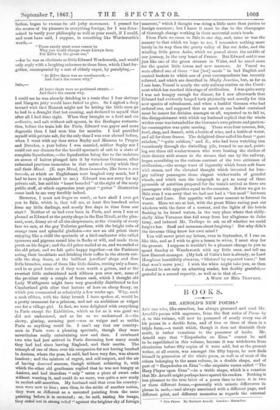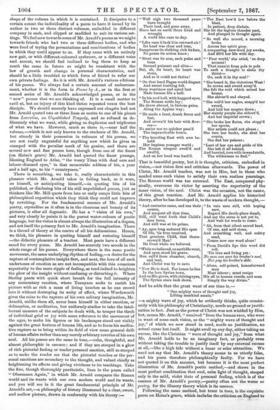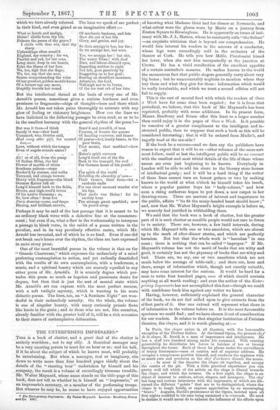B 0 0 K. 8.
MR. ARNOLD'S NEW POEMS.* Aaty one who, like ourselves, has always procured and read Mr. Arnold's poems with eagerness, from the first series of Poems by A. to this volume, will now be possessed of nearly every one of his poems in a double form, and of two or three of them in a triple form,—a result which, though it does not diminish their merit, is rather vexatious to the possessor of books. Mr. Arnold says that " Empedocles on Etna" cannot be said to be republished in this volume, because it was withdrawn from circulation before fifty copies of it were sold, but as the present writer, at all events, was amongst the fifty buyers, he now finds himself in possession of the whole poem, as well as of most of the others belonging to the same volume, in a double shape, and of part of " Empedocles on Etna"—the exquisite verses called " The Harp Player upon Etna" —in a treble shape, which is a vexation that Mr. Arnold might perhaps have spared his readers. Nothing is less pleasant to the true lover of a poem than to have it in two or three different forms,—generally with minute differences in phrase in each,—and always associated with a different page, and different print, and different memories as regards the external
* New Poems. By Matthew Arnold. London: ideomillnu. shape of the volume in which it is contained. It dissipates to a certain extent the individuality of a poem to have it issued by its author in two or three distinct volumes, embedded in different company in each, and clipped or modified to suit its various set- tings. We feel now towards some of Mr. Arnold's poems as we might towards friends who had two or three different bodies, and who were fond of trying the permutations and combinations of bodies in which they could appear to us. If they came with an entirely new gait, or with different-coloured eyebrows, or a different voice and accent, we should feel inclined to beg them to keep as much the same in future as might be consistent with the law of growth and change in personal characteristics, and should be a little troubled to which form of friend to refer our own private feelings. So it is with Mr. Arnold's various editions of his poems. We always feel a certain amount of embarrass- ment, whether it is the form in Poems by A., or in the first or second series of Mr. Arnold's acknowledged poems, or in the " new " poems that we are thinking of. It is a small matter to cavil at, but an injury of this kind thrice repeated vexes the best disciple. We should scarcely have expressed our chagrin had not Mr. Arnold quoted two or three lines as motto to one of his pieces from Lucretius, an Unpublished 7'rayedy, and so refused us de- liberately what we want, while giving us duplicates and triplicates of what we have. However, much as there is,—near half the volume,—which is not only known to the students of Mr. Arnold, but already in their possession in volumes of his poems, we are not really ungrateful for anything new which he gives us stamped with the peculiar mark of his genius, and there are several new and fine poems here, though from one of the finest (on Heine's grave) Mr. Arnold had quoted the finest passage, likening England to Atlas, " the weary Titan with deaf ears and labour-dimmed eyes," in that memorable address of his, a year and a half ago, to his " countrymen."
There is something, we take it, really characteristic in this pleasure which Mr. Arnold takes in falling back, as it were, on himself, or anticipating himself,—in quoting bits of his published, or disclosing bits of his still unpublished poems, just as thinkers like Mr. Mill quote from late or early essays little bits of philosophical exposition which they think they could not improve by rewriting. For the fundamental essence of Mr. Arnold's poetry, crystalline as it often is in the clearness and beauty of its pictures, is after all dogmatic. He has a " vision of his own," and very clearly he paints it in the purest water-colours of poetic language, but the vision is almost always the illustration of a dogma, and not itself the primary fact to Mr. Arnold's imagination. There is a thread of theory at the centre of all his delineations. Hence, we think, his pleasure in quoting himself and restoring himself —the didactic pleasure of a teacher. Most poets have a different mood for every poem. Mr. Arnold has scarcely two moods in the whole range of his poems. Everywhere there is the same poetic movement, the same underlying rhythm of feeling,—a desire for the rapture of contemplative insight first, and next, the love of all such undertones of emotion as are not incompatible with this conscious superiority to the mere ripple of feeling, as tend indeed to heighten the glow of the insight without confusing or disturbing it. Where Shelley pants with quick short breath for the full intensity of any momentary emotion, where Tennyson seeks to enrich his picture with as rich a mass of living touches as he can crowd into it without destroying its unity of effect, where Wordsworth gives the reins to the rapture of his own solitary imagination, Mr. Arnold, unlike them all, never loses himself in either emotion, or delineation, or meditation, but uniformly studies to take the intel- lectual measure of the subjects he deals with, to temper the throb of individual grief or joy with some reference to the movement of the ages, to make his figures or his landscapes stand out visibly against the great horizon of human life, and so to focus his medita- tive rapture as to bring within its field of view some general drift of human affairs rather than any merely arbitrary reveries of his own soul. All his poems are the same in tone,—calm, thoughtful, and almost philosophic in essence; and if they are steeped in a glow of rich pictorial feeling or tender personal emotion, still so steeped as to make the reader see that the pictorial touches or the per- sonal emotions are secondary to the thought, and valued chiefly as heightening its effects and giving vividness to its teachings. Take the fine, though thoroughly pantheistic, lines in the poem called
Obermanu Again," in which Mr. Arnold compares the Roman world and its wants with our own modern world and its wants, and you will see in it the great fundamental principle of Mr. Arnold's art,—a philosophy of history illustrated by a clear, sweet, and mellow picture, drawn in conformity with his theory
" Well nigh two thousand years have brought
Their load, and gone away,
Since last on earth there lived and wrought A world like ours to-day.
"Like ours it look'd in outward air !
Its head was clear and true, Sumptuous its clothing, rich its fare, No pause its action knew ; "Stout was its arm, each pulse and bone Seemed puissant and alive— But, ah, its heart, its heart was stone, And so it could not thrive !
" On that hard Pagan world disgust And secret loathing fell. Deep weariness and sated lust Made human life a hell.
" In his cool hall, with haggard eyes, The Roman noble lay ; He drove abroad, in furious guise, Along the Appian way ; " He made a feast, drank fierce and fast,
And crown'd his hair with flow- ors—
No easier nor no quicker pass'd The impracticable hours.
" The brooding East with awe be- held Her impious younger world ; The Roman tempest swell'd and swell'd, And on her head was hurl'd. " The East bow'd low before the blast, In patient, deep disdain.
She let the legions thunder past, And plunged in thought again.
" So well she mused, a morning broke Across her spirit grey.
A conquering, new-born joy awoke, And fill'd her life with day.
" Poor world,' she cried, ` so deep accurst!
That runn'st from pole to pole To seek a draught to slake thy thirst—
Go, seek it in thy soul!'
" She heard it, the victorious West ! In crown and sword array'd.
She felt the void which mined her breast, She shiver'd and obeyed.
" She veil'd her eagles, snapp'd her sword, And laid her sceptre down ; Her stately purple she abhorr'd, And her imperial crown ; " She broke her flutes, she stopp'd her sports, Her artists could not please ; She tore her books, she shut her courts, She fled her palaces ; "Lust of her eye and pride of life She left it all behind, And hurried, torn with inward strife, The wilderness to find."
That is beautiful poetry, but it is thought, criticism, embodied in vision,—not vision first and criticism afterwards. The power of Christ, Mr. Arnold teaches, was not in Him, but in those who needed some such vision to satisfy their own restless yearnings. The Roman world was too external. The East, conquered phy- sically, overcame its victor by asserting the superiority of the inner vision, of the soul. Christ was the occasion, not the cause, of this great reaction. And Mr. Arnold applies his historical theory, after he has developed it, to the wants of modern thought,—
"And centuries came, and ran their course, "In vain men still, with hoping new, "And centuries came, and ran their course, And unspent all that time, Still, still went forth that Child's dear force, And still was at its prime.
" Ay, ages long endured His span Of life, 'tis true received, That gracious Child, that thorn- crown'd Man!
He lived while we believed.
"While we believed, on earthHe went, And open stood his grave.
Men card from chamber, church, and tent, And Christ was by to save.
" Now Ho is dead. Far hence he lies In the lore Syrian town, And on His grave, with shining eyes, Tho Syrian stars look down. "In vain men still, with hoping new, Regard His death-place dumb, And say the stone is not yet to, And wait for words to come.
" Ah, from that silent sacred land, Of sun, and arid stone, And crumbling wall, and sultry sand, Comes now one word alone !
" From David's lips this word did roll, 'Tis true and living yet : No man can save his brother's soul, Nor pay his brother's debt.
" Alone, self-poised, henceforward man Must labour ; must resign His all to human creeds, and scan Simply the way divine."
And he adds that the great want of our time is,-
" One mighty wave of thought and joy, Lifting mankind amain," —a mighty wave of joy, which he evidently thinks, quite consist- ently with his philosophy of Christianity, needs no ground or justifi- cation in fact. Just as the power of Christ was not wielded by Him, but, muses Mr. Arnold, " received "from the human race, who were in want of some such vision, so the " mighty wave of thought and joy," of which we now stand in need, needs no justification, no actual cause but itself. It might swell up any day, either taking an excuse, like the Christian " wave of thought and joy," from what Mr. Arnold holds to be an imaginary fact, or probably even without taking the trouble to justify itself by any external excuse at all,—like a high tide without a lunar or solar attraction. We need not say that Mr. Arnold's theory seems to us utterly false, and his poem therefore philosophically faulty. For we have not quoted it on this account, but because it is the most perfect illustration of Mr. Arnold's poetic method,—and shows in the most perfect combination that cool, calm light of thought, steeped only in the mild, violet tints of personal feeling, which is of the essence of Mr. Arnold's poetry,—poetry often not the worse as poetry, for the illusory theory which is its essence.
Following the same method, but truer in tone, is the exquisite poem on Heine's grave, which includes the criticism on England to which we have already referred. in their kind, and even grand as
What so harsh and malign, Heine! distils from thy life, Poisons the peace of thy grave ?
I chide with thee not, that thy sharp
Upbraiclings often assail'd England, my country ; for we, Fearful and sad, for her sons, Long since, deep in our hearts, Echo the blame of her foes. We, too, sigh that she flags; We, too, say that she now, Scarce comprehending the voice Of her greatest, golden-mouth'd sons Of a former age any more, Stupidly travels her round The lines we speak of are perfect an imaginative effort :— Of mechanic business, and lets Slow die out of her life Glory, and genius, and joy.
So thou arraig-n'st her, her foe ; So we arraign her, her eons.
Yes, we arraign her! but she, The weary Titan ! with deaf Ears, and lahour-dimm'd eyes, Regarding neither to right Nor left, goes passively by Staggering on to her goal ; Bearing on shoulders immense, Atlantan, the load,
Well nigh not to be borne,
Of the too vast orb of her fate.
But the intellectual thread at the basis of every one of Mr. Arnold's poems, sometimes gives a, curious hardness and even prosiness to fragments—chips of thought—here and there which Mr. Arnold has not taken pains thoroughly to saturate with any glow of feeling or visionary brightness. How can the lines we have italicized in the following passages be even read, so as to be in the smallest harmony with the general rhythm of the poem ?— But was it thou—I think Surely it was—that bard Unnamed, who, G-oethe said, Had every other gift, but wanted
Stared and jewell'd, of men Famous of women the queens Of dazzling converse, and fumes Of praise—hot, heady fumes, to the
love,— Love, without which the tongue Even of angels sounds amiss?
Ah ! as of old, from the pomp Of Italian Milan, the fair Flower of marble of white Southern palaces—steps Bordeed by statues, and walks Terraced, and orange bowers Heavy with fragrance—the blond German Kaiser full oft
Long'd himself back to the fields, Rivers, and high-mord towns Of his native Germany ; so, So; how often ! from hot Paris drawing-rowns, and lamps Blazing, and brilliant crowds,
poor brain, That mount, that madden!—how oft Heine's spirit outworn Long'd itself out of the din Back to the tranquil, the cool Far German home of his youth !
The spirit of the world Beholding the absurdity of men— Their vaunts, their feats—let a sardonic smile For one short moment wander o'er his lips.
That smile was Heine ! for its earthly hour The strange guest sparkled ; now 'tie pass'd away.
Perhaps it may be said of the last passage that it is meant to be an ordinary blank verse with a defective line at the commence- ment ; but even if so, what a flaw in the workmanship to interpose a pis.sage in blank verse, in the midst of a poem written in the peculiar, and in its way peculiarly effective metre, which Mr. Arnold has invented, and of which he is so fond. Even if one did not break one's knees over the rhythm, the ideas are here expressed in mere stony prose.
One of the most beautiful poems in the volume is that on the "Grande Chartreuse," which exprewes•the melancholy of a mind preferring contemplation to action, and yet radically dissatisfied with the results of its own contemplation, with a tenderness, a music, and a spiritual beauty which are scarcely equalled in any other poem of Mr. Arnold's. It is scarcely dogma which per- vades this poem so much as hopeless and passionate desire for dogma, but then that is just the sort of mental state which Mr. Arnold's art can express with the most perfect success, with a soft twilight mystery, which is wanting in his more didactic poems. The lines, too, on "A Southern Night" are won- derful in their melancholy serenity. On the whole, the volume is one of singular beauty, with many curiously pr6saic flaws like knots in the grain ; and to those who are, not, like ourselves, already familiar with the greater half of it, will be a rich accession to their stores of contemplative delineation.
































 Previous page
Previous page